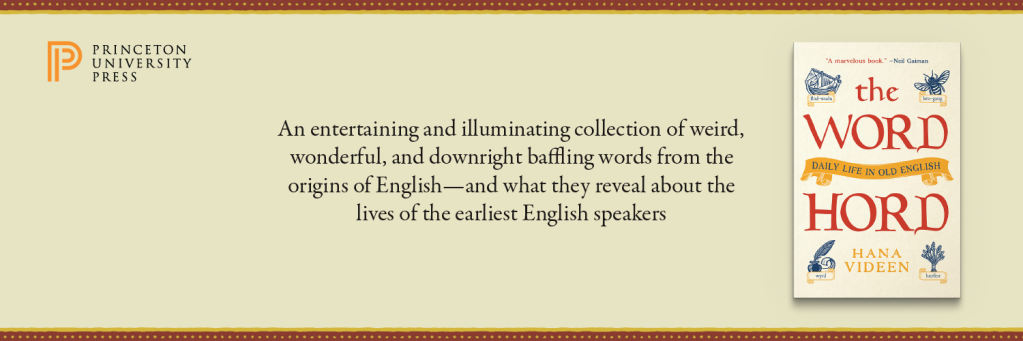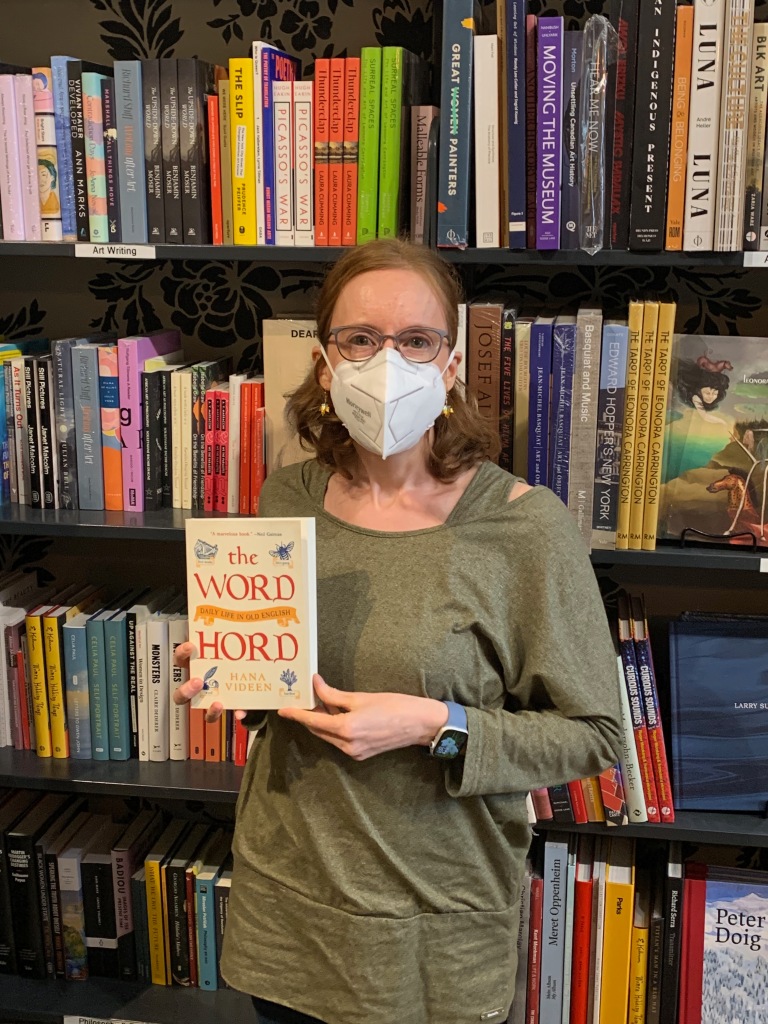An entertaining and illuminating collection of weird, wonderful and downright baffling words from the origins of English…
‘A marvelous book’ – Neil Gaiman

‘The perfect way to be introduced to Old English’ – David Crystal
Old English is the language you think you know until you actually hear or see it. Used throughout much of Britain over a thousand years ago, it is rich with words that haven’t changed (like word), others that are unrecognisable (such as neorxnawang, or paradise) and some that are curious even in translation (gafol-fisc literally means tax-fish).
The Wordhord gathers these gems into a glorious trove of the strange, familiar and unexpectedly apt, and through them illuminates the lives, beliefs and habits of the earliest English speakers. We discover a world where choking on a bit of bread might prove your guilt, where fiend-ship was as likely as friend-ship, and you might grow up to be a laughter-smith.
These are the magical roots of the language you’re reading right now: you’ll never look at – or speak – English in the same way again.
The Wordhord is out now in the UK (Profile Books) and the US/Canada (Princeton University Press)!
Read an excerpt on Literary Hub: No One Ever Said It: On the Long History of “Ye Olde” in English
UK: book + ebook
US/Canada: book + ebook
Audiobook (US/Canada only):
- Princeton University Press (listen to a sample!)
- Libro.fm
- Audible

A Choice Outstanding Academic Title of the Year
Praise for The Wordhord
‘Splendid … it is the perfect way to be introduced to Old English. There is insight on every page, in a beautifully clear and down-to-earth style, with humorous asides.’ – David Crystal
‘It’s a marvelous book.’ – Neil Gaiman
A Choice Outstanding Academic Title of the Year: ‘A special treasure . . . Written in a conversational style that playfully uncovers the meaning of words and their cultural contexts, Videen’s book will appeal to all lovers of language’ – Choice Reviews (American Library Association)
‘A wonderful book heaving with linguistic treasure, a joyfully clever exploration of early medieval life.’ – Edward Brooke-Hitching, author of The Madman’s Library
‘A rich meditation on words, a thoughtful cultural history and a delicious box of delights to dip into during stolen moments. I loved this book – and learnt more from it than from any number of solemn language primers. Hana Videen has created a marvel.’ – Nicola Griffith, author of Hild
‘Wonderful’ – Tom Holland
‘A lovely, lovely read’ – Lucy Mangan
‘Brilliant. So rich with detail’ – Kate Wiles, senior editor of History Today
‘Thorough, entertaining, and absolutely fascinating.’ Paul Anthony Jones, Haggard Hawks
‘A treasure trove of forgotten words, their meanings and origins, written with insight and humour’ – Marshall Julius
‘A classy gift to the commonly word-drunk’ – The Guardian
‘[An] entertaining linguistic history…. Well researched and cannily written, this smart survey makes the old feel new.’ – Publishers Weekly
‘[Videen’s] “hord-wynn” (“hoard-joy”) in sharing her precious treasures is infectious.’ – New Humanist
‘Engaging, conversational, humorous, and full of surprising revelations…. A specialized but delightful book that is essential for undergraduate students of linguistics, literature, and history and will appeal to anyone with a yen for history or language.” – Library Journal
‘Hana Videen is one of a rare and treasurable breed of enthusiasts. . . . Videen is both a passionate medievalist and a relaxed, lucid writer; the pleasure she takes in her subject is infectious.’ – Wall Street Journal
‘Remarkable … Videen beautifully captures the everyday life of Old English speakers’ – The American Conservative
‘A very accessible, almost conversational book … a really delicious taste of the language and the culture of that time’ – Martha Barnette, A Way with Words
‘When the term “wordhord” appears in Old English literature, it is usually paired with “unlock” – which is exactly what this delightful book does. It unlocks the 1000-year-old treasure trove of Old English words that inflect our language and understanding of the world.’ – Sydney Morning Herald
‘A wonderful, very funny look at what the vocabulary of Old English reveals about the culture of the people who spoke it more than a 1,000 years ago. … If you want to learn why “adorned mouse” was the Old English word for “bat,” and why “every protagonist needs a wiþer-wengel,” read this book!’ – Melissa Mohr, author of Holy Sh*t: A Brief History of Swearing
‘Hana Videen describes [The Wordhord] as less a “language primer” than an “old photo album”. Unlike the covetous dragon of medieval literature, jealously guarding its treasure, Videen is more than generous with these rarities, glittering and twinkling like jewels on the page, with palpable wynne (joy). … With this book Videen proves herself to be a gifted scop (storyteller) and an excellent guide to this vanished time.’ – The Times Literary Supplement
‘A captivating piece of work…. Videen’s work also provides an excellent illustration of how a language simultaneously shapes society and reflects it.’ – PopMatters
‘A wonderful blend of language and life that will fascinate and surprise in equal measure’ – Collected Books Durham (Bookshop.org)
‘This book is a treasure trove… [Videen] is a stunning and gifted word detective and writes of her investigations with this nimble prose…. At the end [of The Wordhord] you feel the way that you feel when you come to the end of a Sherlock Holmes tale.’ – Leaf by Leaf
‘Superb mix of erudition and wit … [The Wordhord] is one of those books that not only merit a notebook being kept close at hand while reading but also the conveying of a warning to those around whom one may be reading it that audible exclamations of delighted surprise and unexpected understanding (i.e., “Wow!” and “I always wondered about that!”) are to be expected.’ – The Well-read Naturalist
‘The Wordhord provides a fascinating introduction to early medieval England via evocative words. . . . A carefully constructed project that aims to foster a love of words and their history in its readers. . . . Helped along by Videen’s infectious enthusiasm for the difficult, beautiful language that is Old English, I am certain readers will find many of their own favorite words to treasure.’ – Modern Philology



Find out about Hana’s most recent book, The Deorhord: An Old English Bestiary…